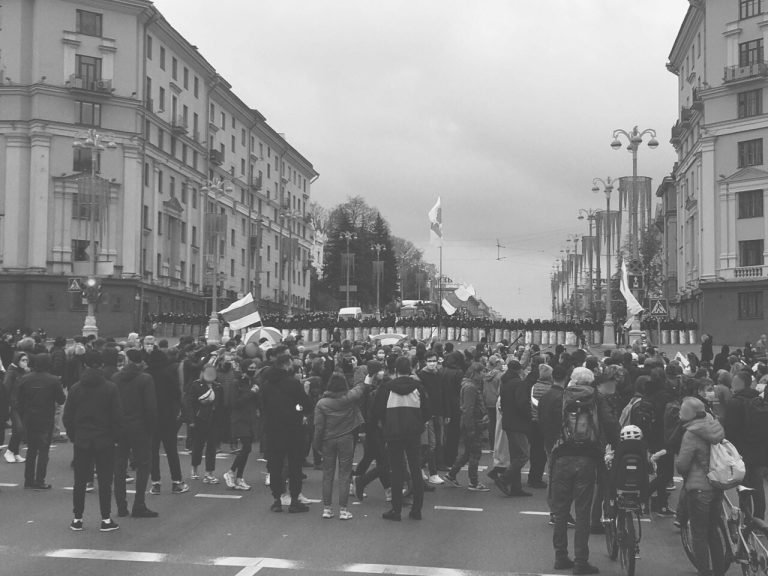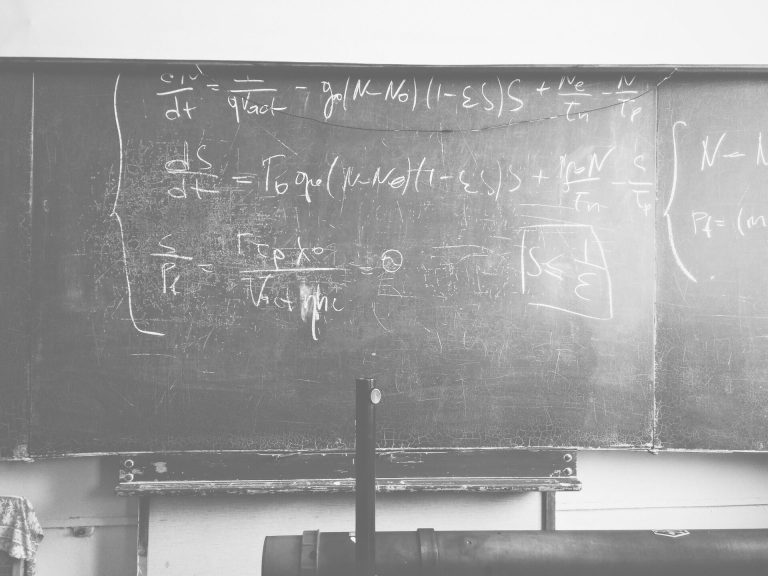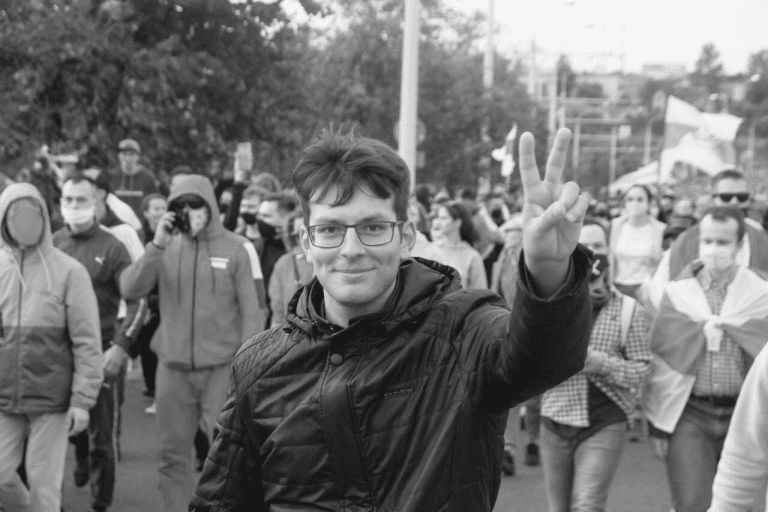If you don’t count my time in prison, I’m 19 years old. My name is Tanya, I’m actually 21. They say that prison years don’t count towards your age. That’s why I can still claim to be 19. That’s also how old I was when I was arrested by the KGB.
I was born and grew up in Minsk, I graduated school specialising in physics and mathematics and then went to the Belarus State University in the Faculty of Mathematics and Physics. I was looking forward to finishing my studies and getting my first job working for the state. I had no expectations to leave Belarus. The prospect of moving somewhere abroad was very distant. It’s incredible how much has changed since.
I remember going to vote in the Presidential elections on 9 August 2020. At that time I knew it was important for the future of my country and I was terribly worried. It was also my first election. It was such an occasion that after I voted my mother and I went to our favourite Minsk restaurant “Vasilki”, which serves traditional Belarusian cuisine, and we celebrated. I had no idea what was coming, it was amazingly calm in the city that day.
That calm didn’t last long, in the coming days, an incredible wave of protests erupted all over Belarus. It’s impossible to fully describe the significance of the events that took place after the elections. The way the Belarusians united at that moment was simply so inspiring. Of course, us students also picked up on this glimmer of freedom. We finally had hope! We could make our future!
We, the students, felt a responsibility to make change happen. We had to finish the process that had begun long before us. It seemed that we were standing at the beginning of something new, something massive. We had to stand proud against Lukashenko just a little more and we would already be living in a new free country!
Maybe it was naive to think so, but that’s how we felt. But it was incredibly, we had pressured the UK, European Union and the USA to impose sanctions on our dictatorship simply by drinking tea with cookies and singing Belarusian songs in the university.
– “Yes, changes never happen quickly.” said an old lady to me later on when I was already in prison, “Everything takes time, during which entire generations can change. And God willing that our children will live in a new country.”
But we felt we were those children. The generation to give birth to a new Belarus! We were building our future! For our youth! I thought we were almost there, unfortunately, these days, it feels like we were only at the very beginning.
The day I was arrested is carved into my memory, I will never forget that day. I can replay that day in my head by the hour, even literally by the minute. I suppose now it seems funny to me, but for the first month in the pre-trial detention centre, at least, the fear of what might happen to me next rushed in front of my eyes every evening, and I could not do anything about it, I could not get the images out of my head. It was hell.
I was detained two weeks later than all the other defendants in the famous “Students’ Case”. Subsequently, these two weeks played a cruel joke on me. Since a day spent in the detention centre counts as a day and a half off your prison sentence. Those two weeks multiplied by one and a half meant I was released from prison three weeks later than all my accomplices. If I had known that this would happen, I would have surrendered myself on the same day as everyone else.
I remember six months later when I finally met the others on trial, my “accomplice” asked me: “Why didn’t you leave?”. I still don’t have an answer to that question. I don’t know why I didn’t leave Belarus and flee to safety in Europe. Maybe I didn’t have the courage.

Until the very last moment, I didn’t believe that anything would really happen to me. Why would I? I didn’t do anything illegal.
Why would I have any premonition that anything bad would happen to me? I’d only protested, a democratic right.
On the last evening before the detention, my mother and I managed to go to our Minsk Philharmonic to an organ concert dedicated to the 335th anniversary of Bach’s birth. I remember that evening very well. Most of the artists performing at that time were young girls. I remember being amazed at how these small and delicate girls could manage with the huge and majestic organ. And what impressed me most of all was the organist Olga Podgayskaya. She performed not only Bach, but also her own compositions. I was pleasantly surprised that there are modern composers who are still writing contemporary music for the organ. It was beautiful.
About six months later, by the time I was already locked in the detention centre, I remember I received a letter from one particular woman. “I am a musician and composer. I perform and write music for my favourite organ.” I read the return address. Olga Podgayskaya! The organist from the night before I was detained. I can not describe the joy that single letter brought to me. I replayed the night before my detention. The music of Bach started to play in my head. What a coincidence! This is my favourite story from the time I spent locked up in isolation.
I did try to write back to her, but of course our correspondence was immediately cut off. I doubt that letter ever made it to her.
Just a couple of days before my arrest, I read an article on how to behave during interrogation. It was intended for anarchists, but the algorithm is generally the same for everyone. The article described various psychological techniques used by Militsiya (the name of the police force in Belarus) during interrogation. Strategies like: please the interrogated, offering him coffee or a cigarette, endlessly repeating the same questions until they get the desired answer, good cop/bad cop – in general, all in the style of traditional detectives. The stuff from films.
When I read the article I thought it was all very cliche. “Does it really work? I mean, is anyone really going to fall for that? They’ve probably already come up with new tricks that are more effective.” In reality, it turned out that There is no need to reinvent the wheel. The article was spot on.
It amazes me how useful that article was for me. I quickly recognised my interrogator’s tricks. I was like he had read the same article as I. In reality it was quite funny. Like a scene from a film And that’s exactly what helped me to keep calm and firm during all the interrogations.
I must give credit to myself, I was quite satisfied with the content of my statement which I wrote during the interrogation. I did not give the investigation any accurate information or facts.
Strangely enough, I wasn’t ever really scared when I was detained in the interrogation centre, I was more curious than anything. The KGB detention centre is an atrium, so that the lower floors can be seen from the upper floors. On the floor where the detention cells are located, the central space is covered with a grid, and the cells are arranged in a circle and shaped like sectors.

The entourage of guards was crazy. It felt like I was Sylvester Stallone. It was as if I was in a Hollywood action film.
Despite the film star feeling prison was far from pleasant. The first thing you have to get used to when you are in prison is the limited space. The cells in the KGB isolator are so narrow that two people cannot fit between the beds, and movement is possible only in one direction. I fully felt it the first time I went to bed. I looked up and realised how small the ceiling area was. Literally four metres long and two wide.
Then there was the Volodarka detention centre which we were later moved to. It’s very different there, but no less cinematic. You can feel the historicity of Pishchalovsky castle, built in the 19th century. The road to the exercise yards passes through half-destroyed towers and through the basement, where two hundred years old vaults have been preserved with wrought iron bars on the windows three fingers thick.
My biggest fear in prison was that my family wouldn’t be there when I got out. Missing family was the hardest thing about my time in the prison colony. On the day of my arrest, the KGB had to search my grandparents’ flat in addition to mine. The law enforcers agreed not to say anything about my arrest, and instead say I was just helping to solve some case. They even let me open the door with my own keys. It was a welcome moment of humanity, even if it did little to calm my grandparents. Naturally, the KGB found nothing in the flat, their only achievement was to worry old people for nothing. And then the moment came when we had to leave came. I said goodbye. I left my keys on the bedside table.

Grandma asked if I’ll be back. Grandpa said, “Can’t you see they’re taking her away?”
I wanted so badly to hug my grandmother and tell her that everything will be fine. I didn’t want her to worry though, I tried to pretend that I wasn’t going away for long, and a hug would have given away what was going on. I didn’t really get to say goodbye properly.
After the case was closed, my grandmother came to see me in the pre-trial detention centre. I remember how grey she had become. She looked so old. That day was the last time I saw her. I had already learnt that my grandfather had passed away. My grandmother lived without him for only six months. I couldn’t even call them from the prison colony.
The human brain is an interesting thing. It was as if those two years had never happened when I was finally released from prison after two years. The city hadn’t changed, the people hadn’t changed. Life went on peacefully. When I tell people out loud that I spent a total of more than two years in prison, I still can’t believe it.
Have I changed during that time? Yes, I have definitely changed. My views on many things have changed. They became more mature, or something…
The people I surrounded myself with changed. A lot of friends just disappeared. But a lot of them stayed. But in place of those who disappeared, came more close and dear I can call real friends.
Perhaps I have become tougher, rougher. But the basic worldview, of course, still remained unchanged. On the contrary, I have become clearer about what I want from life. I had a lot of time to think. But still, I really hope that deep down, all 12 of us have remained youthfully bold and ambitious and have saved our limitless faith in goodness and justice.
After my release, it took me quite a while to get over the dehumanisation they put you through in prison. From the very first day of my imprisonment, it felt like I was not living my life, but watching some art-house film. The film is definitely interesting, but I would only recommend watching it from the outside. Surprisingly, that feeling didn’t go anywhere with the release, but only intensified. I wanted to maximise my enjoyment of everything as a compensation for two years. I wanted to get everything at once. But it didn’t happen. It was like my mind blocked the pleasant sensations, and it took me about four months before I was able to fully enjoy life again.
At the time of writing this I’ve been free for six months. During this time, more things happened to me than ever happened in my entire life. I crossed the border illegally, I started living alone in a foreign country, I went to university for a degree I only dreamed of, I attended a lot of official meetings I never imagined I would ever attend, and finally I learnt English.
And, although many of the memories of the prison are still very bright in my mind, it is increasingly difficult to believe that I really was there, that it all happened to me.
Looking back, I can definitely say: no regrets. I’m not afraid of anything, I don’t regret anything, I wouldn’t change anything in my past. If I hadn’t had this experience, I would never be where I am today. I would never have learnt to believe in myself. I would never learn not to be afraid.





